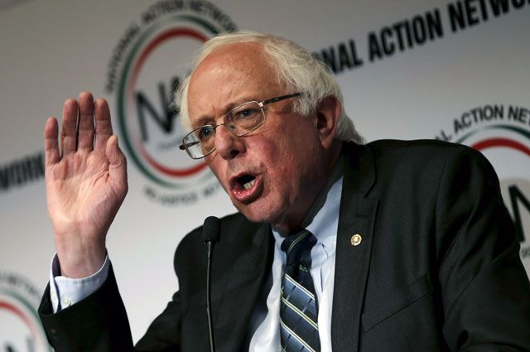In the recent New York primaries, Bernie Sanders experienced some very cold water thrown in his face. Not only did he lose, and soundly, but he was served a major lesson about one of the primary deficiencies in his campaign.
While the pundits joined his campaign organizers in attributing Hilary Clinton’s victory to her past as Senator from the state, most have ignored the problem the this defeat laid bare: Sanders’ campaign is weakest among people of color and, among black people, it has virtually no constituent support.
In today’s United States, you can’t become the Presidential candidate of the Democratic Party without that support. Bernie doesn’t have it and probably won’t get it and so those of us who support his candidacy — which merits support for his integrity, thinking and progressive commitment — are left to analyze why and observe with frustration what could have been. Had Bernie Sanders done a few things differently, he could well have been our next President.
 Bernie Sanders: Great politics and a major deficiency
Bernie Sanders: Great politics and a major deficiency
The tale of woe spins on a problem that will plague the Democratic Party from now on if it doesn’t make the needed adjustment, an adjustment that movements of struggle all over this country have been trying to make for the last 15 years. It starts by answering a simple question: What exactly is the role of people of color, particularly those of African descent, in American politics and how does a progressive campaign like Bernie’s recognize and address that role?
 To hear Alfredo Lopez and Dave Lindorff discussing Sanders and the future of his campaign, click here or on the image
To hear Alfredo Lopez and Dave Lindorff discussing Sanders and the future of his campaign, click here or on the image
There’s an old saying leaders in movements of color use in talking about the white-dominated sections of the U.S. left: “When do we get to sit at the table?” It refers to the ritual among left-wing movements in which white people, mainly men, get together around an issue, formulate the strategy and positions, and then start searching for a “representative” person of color to join their leadership. It has been the norm in some movement politics for almost a century. In fact, it continues today among many movements including those around technology and the protection of Internet rights and, well, Bernie’s campaign.
That “tokenist” approach is a problem on many levels. For one, it ignores the enormous impact of black leadership in so many critical movements — quite possibly the majority of these movements. It emanates, not from bad faith or purposeful exclusion, but from the fact that the Left of this country, as much as any institution we have, is segregated. Movements led by white people and those led by black people have historically failed to unite. That is tragic because, on those occasions when they had united, they’ve won.
It’s a lesson the Left and progressive mass movements are now learning. During the last 20 years, black leadership and leadership of other peoples of color (abounding as a result of affirmative action education and the rise of the social justice movement) have taken over many of the major struggles in this country. The segregation has continued in some quarters but there is clearly a preponderance of leaderships of color in, to name just a few, the struggles over media control, survival of cities, labor and workers’ rights, women’s rights, land rights and the rights of people to determine the use of their local environments — all of these are led by people of the global majority.
Enter Bernie Sanders, a brilliant politician who is so forward-looking in so many places that it’s perplexing that his campaign hasn’t made that adjustment.
When activists from the Black Lives Matter movement, one of the country’s major movements of response and resistance, demonstrated at the Netroots Nation conference in 2015, Sanders took the most progressive line of the candidates confronted but was still clearly flustered. The opportunity to make a statement that would win over those activists and impact the thinking of people of color nationally drifted by him in a cloud of confused embarrassment. He tried but nothing he could come up with would work and that’s because he just didn’t understand what to come up with.
Instead, in a move that actually angered many movement leaders of color, he appointed a black woman to his campaign leadership — exactly the attitude that has tokenized the dinner table for so many decades.
Voting results show it hasn’t worked and the many activists of color who support his candidacy have been left frustrated. Clearly most left-wing activists of color support him because, as he points out, the program he espouses would positively affect all lives, including the lives of their communities. Supporting the most progressive Presidential campaign in modern history just plain makes sense for an activist.
But the key here is not to win activists’ and leaders’ support but to arm these activists with a program to mobilize the millions of people they work with, organize and, in the unstructured process that makes movements successful, influence. They need the ammunition and Bernie has left their gun barrels empty.
What, then, should he have done? The “quiet conversation” among movements of color is that he should have eschewed the “join our table” tendency and consulted these people early in his campaign: called them together to develop the relevant planks of his electoral platform. And what would they have told him? To avoid the “trickle down” politics he has espoused and speak on the “particular issues” that affect their peoples. There are many of them but, to illustrate, let’s take three.
Reparations — This is controversial because most people in this country don’t understand it. No one is asking the government to send a check to every black family or to “pay them off” for what racism has done. This is about building a program of vitalization of black lives because people of African descent have played a decisive role in the economy and social success of the United States and they have gotten nothing but inequality and pain in exchange.
In the murky debates around race and racism, what is often lost or not even broached, is the role people of African descent played in building this country’s economy through the production of its principal and most lucrative crops to the development of a sophisticated banking system in which black people themselves were the collateral.
While what should be done about that is the subject of debate in some circles, it’s not part of any national conversation and the candidate who calls for that conversation and promised to help structure it will win the Black vote. It would signal to black people that Sanders is paying attention. Instead, Sanders has insensitively dismissed the concept out of hand saying he “opposes reparations” because it isn’t fair to contemporary white people: a position that wreaks of insensitivity and betrays a profound racism.
Re-segregation — The combination of charter schools, magnet schools and redistricting has re-introduced public school segregation into many communities of this country. Segregation means a lot of things. In general, it reflects an almost certain inequity in spending, the assignment of experienced teachers, facility quality and treatment of students. But, for black people, it also means a huge betrayal because integration of public schools was a pillar of one stage of the civil rights movement: one of the most important and largest movements to have broad social impact on everyone, a racially integrated movement that was led by black people.
Segregation is illegal in this country. Who is enforcing that law? What does Bernie intend to do as the primacy protector of rights and laws in this country? From what he’s said, nothing. Just calling attention to that issue would boost his campaign enormously.
Dying cities — The epidemic of city disappearance in this country takes many forms. There is the death by policy and neglect that places like Detroit, Michigan and Camden, New Jersey have faced. There is the death by encouraged displacement (often called “gentrification”) that plagues San Franciso, New Orleans, Brooklyn and scores of areas, towns and cities all over the country. There is death by resource denial as in Flint, Michigan.
While the contours and specifics vary, the outcome is the same: black people, people of color and poor people lose their homes, must move from their neighborhoods, lose jobs, must pull their kids from schools, lose their friendships, and find their daily routines (the glue that holds their lives together and very often celebrates their cultures) spectacularly disrupted. People are begin discarded in an epidemic of displacement.
Nobody can argue that this isn’t an abomination. But who will come forward with a simple, gutsy statement: as an American citizen, you have the right to a stable home and neighborhood? Which candidate will make the statement that needs making: gentrification is a public threat that, perhaps can’t be eliminated in this system and period, but must be controlled and that people who are displaced must be compensated and sensitively re-established. Not Bernie and if he would make that statement, he would win people of color over.
There are other issues that need addressing. While Sanders has spoken about “immigration” in a semi-progressive way, the position to take on immigration is amnesty for all migrating peoples and then allow the resulting conversation about who was here first, who took whose lands and why, and what is happening in places people migrate from. That conversation would be a huge contribution to this country’s self-awareness and would distinguish Sanders’ campaign.
He doesn’t have to take sides on it. All he would have to do is call for national consideration of it: a kind of program of human valuation — something that says “you are important between elections”. In fact, doing that would do more than attract support from votes of the global majority. These political positions tend to spread their impact: when you are recognizing the concerns of certain groups, others will be more confident in asking you to pay attention to them.
This isn’t a change of politics affecting certain groups; it is a change of concept for a political campaign. If you’re flying the flag of “different and progressive politics”, you have to organize a campaign that emanates, not from a candidate winning people over, but from people, communities and movements educating the candidate.
That he has done none of this is a reflection, not of Bernie’s character or intelligence, but of the fact that he is imprisoned in the traditional approach to politics. For him it’s all about faces, like Reverend Al Sharpton, and vague statements like “of course black lives matter”. But these are mere gestures, expedient responses to what appears to the Sanders campaign to be people seeking to be bought off. He appears to not understand this movement and, as a result, he will not be President of the United States.
It’s curious because Hilary Clinton, who enjoys widespread support in communities of color, hasn’t done much in her campaign to court those communities. But she did one thing that will never be forgotten by people of color: she joined and was central to the administration of Barack Obama. That act makes her part of a historic moment that black people in this country thought would never happen and it gives them a sense of confidence in her.
Bernie deserves that kind of confidence much more than she does but he doesn’t have it. He should be President not because he deserves it, although he does, but because we deserve a President like him. That this apparently isn’t going to happen makes our work as a movement that much more difficult.
